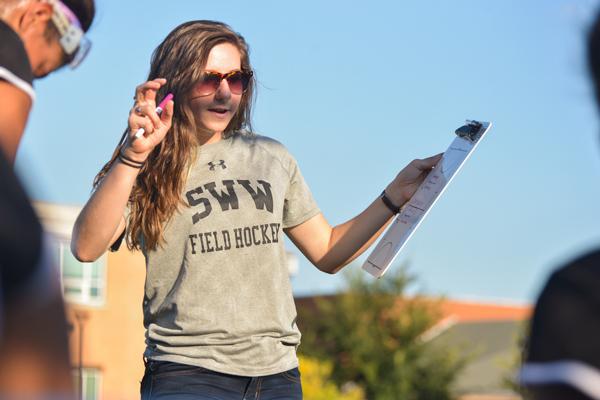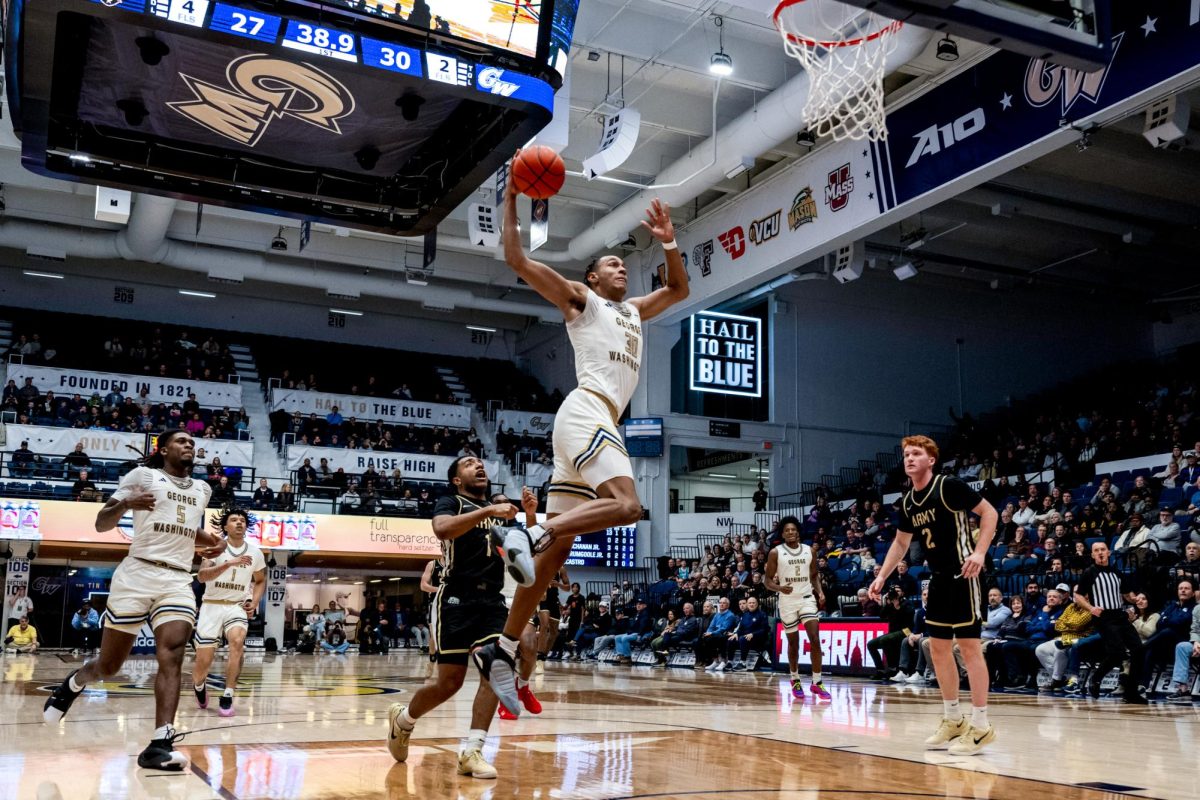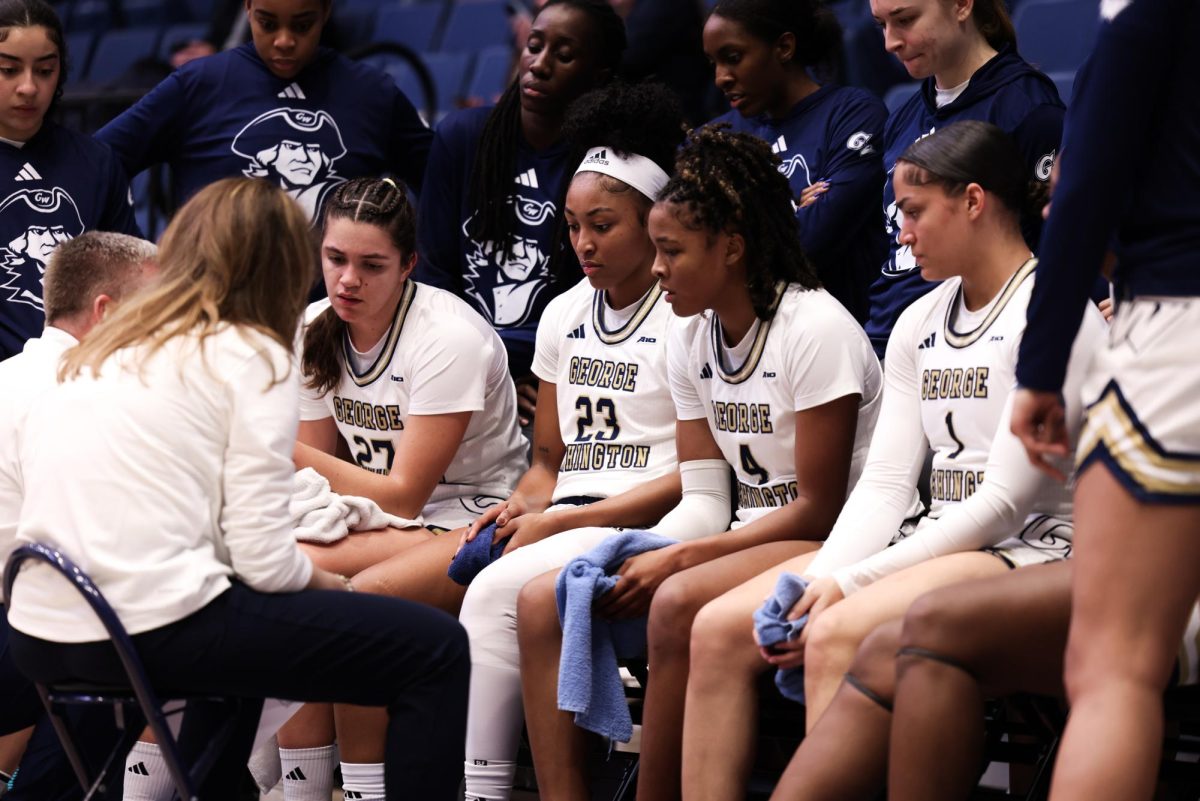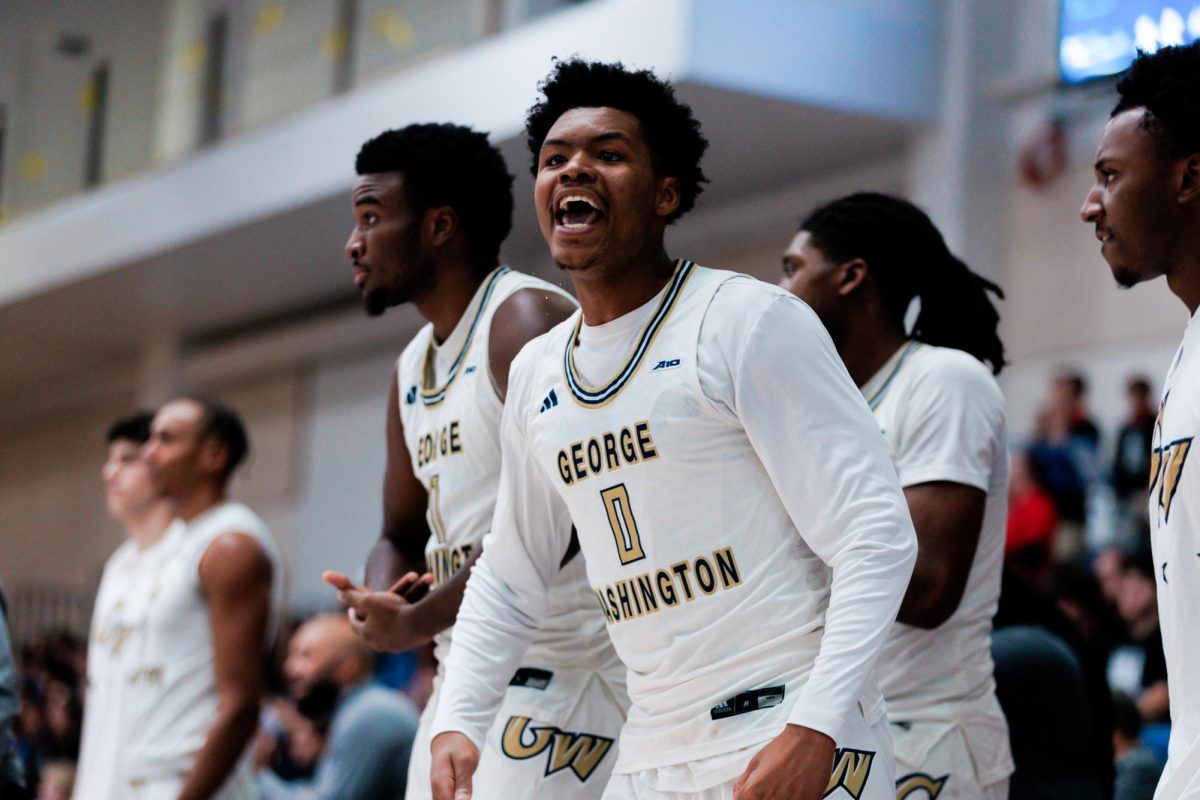The sun shone bright and it was warmer than it had been in weeks. But the School Without Walls girls’ field hockey team had gone cold. It was Wednesday, they were playing an away game against the more-experienced Sidwell Friends School and, by halftime, the score was 6‒0.
Cameryn “Cammie” Lonsway, the head coach for the magnet high school on G Street, called them over to the sideline. She pulled out a white board and began furiously jotting down notes for her players. The dull thump of the sixth goal smashing into the backboard of the Walls net distracted her only momentarily before she resumed her feverish scribbling.
During the first half, Lonsway’s actions fit the “high school coach” mold perfectly: running up and down the sideline, crouching, glaring, shouting directions and encouragement. But unlike Sidwell’s middle-aged coach in her windbreaker, baseball cap, sunglasses and neon blue running shoes, Lonsway did not look the part at all.
She looked more like the GW sophomore and club field hockey player that she is – with her voguish sunglasses, blue jeans, grey Walls shirt and black boots – than someone spending weeknights playing mentor, instructor and disciplinarian.
“I have a whistle that makes me feel really official,” Lonsway said, laughing. “I was afraid they would mistake me for a player but no one has done that yet.”
Lonsway boasts a diverse resume. In high school, she was a three-sport athlete who studied Swahili. After college, the 19-year-old international affairs major wants to go to law school and possibly work for the Peace Corps or the United Nations.
It would be hard for her to seem more like the prototypical D.C. college student. But instead of interning on Capitol Hill or scouring K Street for internships, Lonsway went in a different direction on the job hunt when she saw that the School Without Walls needed a field hockey coach at the beginning of this year.
“I thought I’d never get it. They’ll have so many more experienced people than me,” Lonsway said.
She thought it was unlikely she’d even hear back. But two Skype interviews and a meeting with School Without Walls athletic director Kip Smith followed and then, a week before her classes started, Lonsway returned from her summer break to become the program’s third coach in the five years since its conception.
“After I met with her and had discussions about field hockey and the program and how we’re looking to rebuild the program, [I knew] she was the perfect fit,” Smith said. “I don’t have to run around and make sure, ‘Did you do this, did you do that?’ She’s been very efficient.”
Lonsway wants to expand the schedule from its current five games to 10, which Smith said was “definitely feasible,” to get the team more experience.
“They’re all relatively new to the sport,” said Lonsway, who has played field hockey since she was in fifth grade. “Coming from the high school I came from, it’s different.”
Lonsway credited the older athletes on the team for their experience and leadership in helping keep the young program on track.
The team consists of 12 freshmen and sophomores, zero juniors and four seniors, one of whom has been with the program since her freshman year and another who is in her first year of the sport. Lonsway estimates about 75 percent of the team had never played field hockey, or any team sport for that matter, before the first game.
“I was sending in my very first subs and they start running on the field before the [other] girls even come off the field,” Lonsway said, feigning mock terror. “I’m screaming, ‘No! No!’ I didn’t know they would have no idea about just how to sub.”
Other than inexperience, the program faced numerous challenges. Only five people showed up to the initial interest meeting. The school doesn’t have the facilities to host games so their entire schedule is played at other schools. Their budget was nonexistent at the beginning of the season and equipment was nowhere to be found.
Lonsway, seemingly, found solutions. Sixteen girls are now listed on the roster. The team organized a bake sale that raised hundreds of dollars for the program. She has worked with Smith to come up with balls, jerseys and other equipment and enlisted the GW club team to host clinics for the high school players as their community service project. She has gotten the parents in lockstep, too.
“She’s very good at managing the parents,” said Mary Agnes Carey, mother of a freshman on the team. “She’s not intimidated at all.”
Carey and her husband, Ross Brennan, said Lonsway hosted a parents meeting and single-handedly enlisted all the parents in service of the program. Each week, she sends out a spreadsheet with a list of assignments for the parents, who Lonsway says are always a “huge help.”
At the Sidwell game, Lonsway began halftime by asking for the team’s input on their own play. The older players dominated the conversation, but the younger ones piped up on occasion as well. They pointed out strengths and weaknesses in themselves and in the other team. They talked strategy and encouraged one another to play harder. Their coach listened and smiled the whole time, willfully ignorant of the numbers on the scoreboard.
“I’ve seen steady improvement,” Lonsway told them. “Use this as a time to learn. Go out there and be confident.”
She began rattling off her notes from the white board: Attack the ball, quit passing to nowhere and, for the ninth time since the game began, “Don’t stop your feet.”
The team ran back on the field, needing only two tries to pick the right side to defend, and ultimately only allowed two additional goals.
“They showed really great improvement,” Lonsway said.
Post-game, the white board didn’t come out. Instead the team sat in a circle and reflected on the game. There had been some conflict between teammates and the outcome of the game was not endearing to anyone, but Lonsway guided the conversation to the more aggressive second-half defense and the two near-goals that nearly threw her into hysterics on the sideline.
They ended with “kudos,” a tradition Lonsway borrowed from her high school team, in which a few girls get the opportunity to point out one or two people on the team who did something positive during the game. The ritual went on longer than Lonsway intended because the girls kept volunteering to acknowledge their teammates.
The team dispersed into laughter and chatter. The Sidwell game had put their record at 1‒3 with one game left in the season, but the blowout loss was out of their minds already. Their focus moved onto homework, the coming long weekend and the final game against Woodrow Wilson High School. One player tried to convince people standing along the sideline that it’ll be “way better.”
Lonsway’s focus moved to making sure everyone had a ride home and that all the equipment was cleaned up. There was no long weekend for her, and she had her own game, against Johns Hopkins on Sunday, to prepare for.
And yes, Coach Cammie has homework, too.







